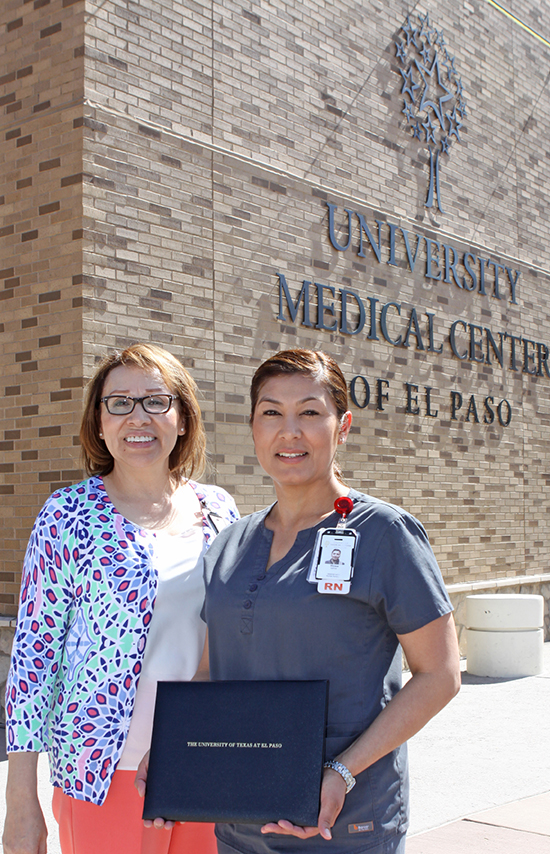By Daniel Perez
Originally published in the El Paso Times on May 31, 2015.
Rosa Garcia is a nurse who has risen in rank and responsibility at area hospitals since 1998, but a few years ago she began to sense that she needed to enhance her education to keep up with her peers.
Garcia recently completed an online bachelor’s degree in nursing from The University of Texas at El Paso. She is interested in pursuing her Master of Science in nursing – nurse practitioner degree in a few years. The graduate degree is among those offered through UTEP Connect, the University’s collection of fully online degree plans and certificates that launched May 4, 2015.
Nontraditional students such as Garcia – self-directed adults whose work schedules and responsibilities may keep them away from traditional brick-and-mortar academic settings – are the target audience of UTEP Connect. The El Paso native and first-generation college student said online courses help her juggle home, work and school.
“(Scheduling) would have been a lot more difficult if the classes had not been online,” said Garcia, nurse adviser in University Medical Center’s surgical orthopedic and trauma unit.

Online education is gaining in popularity at UTEP and across the country. A 2014 study by the U.S. Department of Education showed that approximately 26 percent of the country’s 21.2 million college students took all or part of their course materials online. The most recent data from UTEP’s Center for Institutional Evaluation, Research and Planning show that 9,219 students enrolled in the campus’ 630 fully online courses during the 2013-14 academic year compared to 4,419 students who took 319 online courses four years earlier.
Mike Smith, Ph.D., has overseen the development of UTEP Connect as dean of Extended University, the institution’s administrative umbrella for nontraditional academic offerings. He said the flexibility of online education benefits prospective students such as those in the military and law enforcement, and people who want to finish degrees, enhance their skills or transition to new careers.
“Some of our military students, for example, are deployed and log into the courses from Afghanistan,” Smith said. “UTEP Connect online programs allow working adults to earn a degree and an invaluable credential for promotion or advancement in the workforce.”
The UTEP Connect degree plans include bachelor’s programs in criminal justice, security studies, organizational and corporate communication, multidisciplinary studies, health promotion and pre-business, and master’s programs in nursing, defense and strategic studies, and bilingual and early childhood education. A graduate certificate in technical and professional writing also is offered.
Smith added that employers profit by retaining better educated, more adaptable employees.
In some cases, employers offer financial assistance to employees to enhance their educations. University Medical Center (UMC) and Texas Gas Service/ONE Gas are among the region’s companies with academic reimbursement programs. In general, employees work with their supervisors and human resources departments to ensure the correct courses are taken. Employees pay up front, but are reimbursed after they show they have successfully completed their courses.
UMC sees these financial incentives as an investment in employee success and patient care, said Maria Sanchez, the hospital’s nurse manager. She said statistics show patients served by registered nurses with a BSN have a significantly lower mortality rate.
“We want better-prepared nurses with better critical thinking skills to be better patient advocates,” said Sanchez, who also serves as a part-time clinical instructor at UTEP. She said Garcia was one of about six of her nurses who have earned their bachelor’s in nursing degrees from UTEP. “It’s just part of the big picture.”
Alex Limon, operations director for Texas Gas Service, said he was excited about the new degree plans offered through UTEP Connect because they provide the necessary flexibility working students need to improve themselves.
Limon, who earned his bachelor’s degree in civil engineering from UTEP in 1992, said his company’s tuition assistance program creates value for current employees, is an incentive for future employees, and is a tool his company uses to keep talented individuals with the company and in the community.
To learn more about the UTEP Connect suite of programs, visit online.utep.edu.
Daniel Perez is a writer with UTEP’s University Communications office.